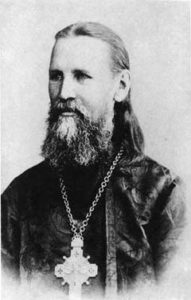SSCORRE!
Saint Sophia Cathedral
Online Resources for our Religious Edification
Topic of the Week – The End of Comfortable Christianity
Times are coming when a man won’t be forced to renounce Christ as was done in the first centuries of Christianity. It will be a latent anti-Christian infection, when false values, incompatible with the Gospel, will be imposed upon us, offering falsehood instead of truth, under the guise of truth. There can be a renunciation of Christ here too—this should be feared no less than open persecution.
Apostasy from Christ can be silent, when we see lawlessness and remain silent, or when we’re called to commit this or that immoral act, and we do it only because others are doing it, so that no one would point a finger at us.
Adult/Family:
Well, the times they are a changin’. This American idea has evolved into the idea that the right of self-expression is now the highest American virtue, and it trumps all other rights. The right to assembly no longer means that I can meet with people who share a common interest. All must be allowed to join whatever they wish to join, regardless of what the group or organization stands for. This is now impacting Christian colleges and universities who must include those whose lifestyle or belief is counter to traditional Christianity.
Curiously, in times of change, the power of conformity is great. We call it “political correctness.” To feel accepted, respected, and to avoid any kind of persecution, we will live no differently from others and speak no differently…. most of us live somewhere between the hope of being true to ourselves and conforming to the world. The time is near when we can no longer find a safe spot and compromise will mean leaving the Kingdom of God. The time of comfortable Christianity is passing.
For the Orthodox Christian, neither self-expression nor conformity to the world is the highest value. As St. Paul said, we are not to be conformed to the world, but transformed by Christ. To take on the image of Christ is to be hated by the world. So we might judge that because the world has not hated us, we have succumbed to the conforming power of the world.
There was a time when it seemed that Christianity and society had a more comfortable relationship. The culture seemed to reflect the values of the Church, and members of the Church felt that being a good citizen was their highest and best calling. Some wish we could go back to those times (even if such a state never really existed)….
“We live in a time of exile. At least those of us do who hold to traditional Christian beliefs. The strident rhetoric of scientism has made belief in the supernatural look ridiculous.…The Western public square is no longer a place where Christians feel they belong with any degree of comfort.
It is also being driven by issues that few predicted would have such cultural force…. We are indeed set for exile, though not an exile which pushes us to the geographical margins. It’s an exile to cultural irrelevance.”By ROD DREHER
I maintain that cultural irrelevance is not the end of things, but the beginning.
1. Community
In exile, it is vital that we draw closer together in community. This doesn’t mean that we close our doors to the world or move to Montana. It means that it is the Church, and not our circle of friends, family or work, from which we will draw our strength and protection. We will need our Orthodox brothers and sisters, priests and hierarchs to draw closer together in love and mutual support. The Sunday Liturgy is an expression of our community, but once a week is not enough for those in exile. The fellowship that we will share in these meetings will be vital. We must abandon the American myth that we are all self-sufficient individuals and can do just fine on our own. This is the way the early church survived dark times of exile.
2. Liturgy
In exile, infrequent communion and poor attendance will not be enough to face what is coming. More than ever, our spiritual life must be our number one priority, above work and family and all else. We will need strength to be able to witness to our family, to train our children so that they can understand why they face ridicule for being a traditional Christian. We may want to rethink our abandonment of worship on Saturday night. The Church has a liturgical schedule that can counterbalance the rhythm of the world.
3. Study
Since this exile is in part ideological, we must know how to respond. We must be sure that we know the teachings of the Church and how they are to be applied. The truth will set us free, but if we are ignorant of the truth, the world will easily ensnare us. We must study or die.
4. Prayer
The Saints in exile displayed incredible courage and commitment to the Lord. They were men and women of prayer. In work and in all of life, they had communion with God. When community, Liturgy, and study were taken away, it was prayer that sustained them. If the voice of the prophet is being heard again, and our exile is near or already here, then it is time that we commune with God until life becomes prayer and prayer is life. We must be ready, and we will be ready if we are people of prayer. After all, it is spiritual warfare and must be fought spiritually.
We are entering a time that we thought would never return. I know it may be hard to believe. We have always believed that the freedoms guaranteed in our Constitution would protect us. Now those freedoms are being used against us. Whether you compromise with this society or not will depend on your allegiance to Christ and the Holy Orthodox Faith. As the Apostle said, if you love the world, the love of the Father isn’t in you.”
Taken from The End of Comfortable Christianity?
Preschool/Elementary:
“It is not of any value to us how the world is going to regard or call us.
However, it is important, and extremely important, how the holy angels in the heavens will regard and call us when, after death, we meet with them.
This is of crucial importance and everything else is nothing.”
Excerpted from The Prologue of Ohrid, Homily on fools, wiser than the world, p183
Middle School:
“…I’m afraid that many of us who call ourselves Christians don’t understand this foolishness of Christ. We have given in to a false and heretical form of Christianity – a Christianity that is a comfortable, easy, and that doesn’t really demand much: Go to church once in a while, follow most of the commandments, try to be a “good” person, wear a cross and have a few icons, maybe even go to Project Mexico or some OCMC mission trip or help out at some local outreach or charity so that we feel good about ourselves.
High School:
“What is the greatest temptation for Orthodox Christians in modernity?
I would say, probably, the main temptation faced by the Orthodox Christians in the West in modernity in general is double-mindedness, in the sense of wanting to be faithful Orthodox Christians, but at the same time being able to live comfortably in the world.
I think for a lot of Orthodox Christians, there’s a sort of tension within us. There’s the faith that we received and that we want to hold on to and that we want to live in a full and authentic way. But there’s also, I think for a lot of us, this fear almost that what the world says is really true or is really correct about a number of things. So, we have in us this, I guess, cognitive dissonance. It’s a psychological term, for we don’t know how to keep both of them within us at the same time. The temptation is to compromise our faith or to ignore parts of our faith that are inconvenient for life in the modern world.
I’ve been thinking recently about the fools for Christ and how important a witness the fools for Christ are to us.…I think we as Orthodox Christians are immersed in this extremely sinful culture, and yet we lack that disdain for the praise of the world that the fools-for-Christ possessed. I think that puts us in a dangerous situation because of our care for how others will perceive us. I think it weakens our ability to resist sin.
It all comes down ultimately to what Christ told us: You know you cannot serve God and mammon, you cannot love father and mother, or sister and brother, lands or possessions or anything else, more than you love Me. If you are not willing to take up your cross, you cannot be My disciple.
Similarly, with what the apostle says in the New Testament, that love for the world is hatred for God.
In order to overcome that double-mindedness…I think first for us particularly, it is the ability to care absolutely nothing for what anyone thinks about them because they know they are seeking the will of God….
…what we need to do is to resolve first of all to not care what anybody thinks about us, whether that’s our Orthodox brothers and sisters or their family members, friends, or coworkers, whoever else that may be that we encounter in our day-to-day life. We have to be willing to suffer exactly the same kind of scorn, mockery, ridicule, that first of all our Savior suffered on the cross, then following His example, the fools for Christ suffered from their fellow-believers as well as from worldly men and women.
As long as we care about our own reputation, in the way that others perceive us, I don’t think we are going to be able to be faithful Christians living in the world. I don’t see how that’s possible. For a long time I thought it was possible, when our culture was more Christian, to live a life that was outwardly respectable and at the same time to at least to a certain measure be faithful to the Gospel commandments. I think it’s clear that our society has progressed far beyond that point.”
Excerpted from The Greatest Temptation for Orthodox Christians / OrthoChristian.Com
A Message from Maria Spanos
I am passionate about our Orthodox Christian faith and seek to help others learn as much as they can about it. My purpose here is to share online resources that help strengthen our relationship with Christ and bind us closer to His Church. I believe they are invaluable in learning about our precious Orthodox Tradition, and are a great aid for teaching family members, friends and others about Orthodoxy. ~Maria
Two of my favorite quotes:
 “A true Christian behaves in this life so that it may be a preparation for the future one and not only a life here below. In his actions, he does not think what will be said of him here but of what will be said there in heaven; he represents to himself that he is always in the presence of God, of the angels and all the saints, and remembers that someday they will bear witness of his thoughts, words, and deeds.” — Saint John of Kronstadt
“A true Christian behaves in this life so that it may be a preparation for the future one and not only a life here below. In his actions, he does not think what will be said of him here but of what will be said there in heaven; he represents to himself that he is always in the presence of God, of the angels and all the saints, and remembers that someday they will bear witness of his thoughts, words, and deeds.” — Saint John of Kronstadt
__________________________________________________________

“Of all the holy works, the education of children is the most holy.”
— St. Theophan the Recluse







